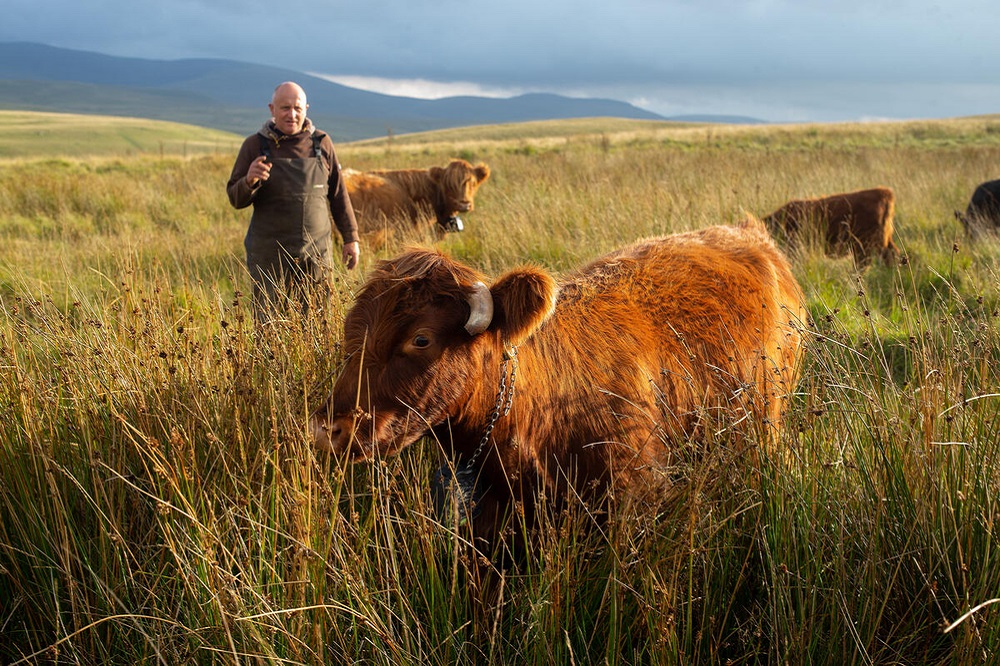Agroecology – can working with nature create a more dependable revenue for farmers?

Hywel Morgan and Sue Pritchard
Hywel Morgan farms at Esgairllaethdy in Myddfai, Carmarthenshire. The farm comprises 230 acres, including 20 acres of rented land, 50 acres of conservation grazing, plus grazing rights on the adjoining common land known as Mynydd Du. There are also 25 acres of native woodland.
Ever increasing input costs and stagnant output prices were the key deciding factor for us to use nature-friendly methods on the farm. We can control what we spend our money on but have little control over what we get for our products – but we’ve seen that working with nature has helped us have a more dependable revenue.
Changing the Agri Policy post-Brexit was also a driver for change for us. We sell produce straight from the farm to customers and many want to know what production methods are used, with the vast majority wanting chemical-free produce produced with respect to nature.
The methods we use to work with nature include cutting out bagged fertiliser and chemicals, reducing brought-in concentrates and a big reduction in using animal medicine.
Using nature’s free resources just makes sense to us and we’ve been really pleased with the changes we’ve made here at Esgairllaethdy. We’re now utilising the sun’s energy, rain, self-seeding perennial grasses and our common land.
Since cutting out fertiliser we are growing a lot more clover here which helps maintain soil moisture.
Turnover
Our turnover is less but the leftover has improved and our business is more profitable because of it.
From making these changes ourselves, I believe that we need a policy to financially reward us to cut our stocking rate so we can farm to the optimum rather than the maximum.
On our farm, we’ve already reduced sheep numbers and increased the suckler herd by utilising cattle manure more efficiently. Doing this enables us to increase biodiversity on our land, improve our soil, water and air quality and produce better, more nutrient-dense food.
Another change we’ve done that could be encouraged as part of the policy is to manage our hedgerows differently – letting our hedges grow for a much more extended period creates a great increase in food and habitat for wildlife. Different hedge management regimes can also create timber for coppicing and work for more rural people. We’ve recently grown hedges much taller and thicker which gives a lot more shelter from the wind and has been very useful on hot sunny days.
We should be rewarding farmers for working with nature, not against it. The change must be both policy-driven and supported by consumers too. Currently, we have a system that also rewards landowners to do nothing, and in some instances, we have people being rewarded that don’t have control of the land. Rewarding a working farmed landscape to work with nature at the forefront is key.
Working with nature is what we as farmers should be doing – it’s a win-win situation for everyone; the farmer, climate, biodiversity, wildlife, habitats and the environment.

What is agroecology?
Sue Pritchard is the Chief Executive of the Food, Farming and Countryside Commission, an organisation with a mission to bring people together to act on the climate, nature and health crises, through fairer and more sustainable food systems, and a just transition for rural communities and the countryside. Sue and her family live on an organic livestock farm in Monmouthshire.
Agroecology describes a growing movement including farmers and food producers who are using fair and sustainable regenerative practices to support progress towards the UN Sustainable Development Goals. But it is more than a way of farming – it is a way of describing a healthy food system with huge potential to tackle climate change, regenerate landscapes, restore nature, improve health and develop local food cultures.
Looking at it as a set of scientific principles, it is an approach which optimises the interactions between plants, animals, humans and the environment while also addressing the need for socially equitable food systems within which farmers and growers receive fair returns and people can exercise choice over what they eat and how and where it is produced.
Food production
Keeping food production at the core of land management, growing enough healthy and sustainable food for all, the approach can also support species abundance in and beyond the farmed landscape while looking to reduce emissions by upwards of 70%. Following agroecology principles ensures that we do not unnecessarily export production (or externalise environmental impacts) overseas and finds a broad pathway for resilient and sustainable farm businesses across Wales and the wider UK, and in so doing taking more responsibility for UK food security.
Our Farming for Change action research programme contributes a body of work with farmers towards the ultimate goal of a transition to agroecology in partnership with communities across Wales.
This is not however just a theoretical set of scenarios. Practical change is already underway. In early 2021, following the publication of Farming for Change, an analysis of our initial IDDRI research findings, we gathered farmers, growers and other experts together in the Routes to Action workshops, to find out what the IDDRI modelling means in practice for food and farming businesses across the four nations. Their contributions demonstrate that, for many, the transition to agroecology already makes economic and agronomic sense.
In our Field Guide for the Future, and during our Land Unlocked tour (bringing grassroots farmer voices to COP26), we met yet more individuals and communities taking action across the country. They are moving to regenerative farming practices, re-localising supply chains, and working in and with their communities to respond and adapt to the climate and nature crises – all while creating more space for nature and producing more healthy food sustainably.
To learn more of our work to date you can visit a range of evidence found on our website at www.ffcc.co.uk
Support our Nation today
For the price of a cup of coffee a month you can help us create an independent, not-for-profit, national news service for the people of Wales, by the people of Wales.





Agricultural practices have to become sustainable if we are to truly protect farming communities. Modern, intensive farming is destroying nature to produce products we’re being told we should be eating less of (red meat and dairy products) – it has to change.
Farming the right way,terrific.